President Bola Tinubu has inaugurated the Presidential Economic Coordination Council (PECC) and launched the Economic Stabilisation Programme to ensure food security, improved power supply, enhanced social welfare and healthcare, increased energy production, and overall economic transformation.
Tinubu inaugurated the PECC at the Presidential Villa in Abuja on Thursday, July 4, 2024.
Speaking at the inaugural meeting of the 31-member PECC, Tinubu, who chairs the council, announced measures, which will run concurrently with the National Construction and Household Support Programme, to stabilise the economy, enhance job creation, and foster economic security.
According to a statement issued by the Special Adviser to the President on Media and Publicity, Ajuri Ngelale, the measures under the Economic Stabilisation Programme are:
(1) Energy Security
The Energy Security Initiative, which includes power, oil and gas, aims to:
– Increase on-grid electricity to be delivered to homes and businesses from about 4.5 gigawatts to 6 gigawatts in six months;
– Increase oil production to 2 million barrels per day within the next 12 months; and
– Remove barriers to entry for investments into the sector to enhance competitiveness.
Tinubu: It’s shameful we’re still generating 4.5GW of electricity
(2) Agriculture and Food Security
Under this plan, the aim is to:
– Increase staple crops grown by small-holder farmers from 127 million MT in 2023 to 135 million MT this year;
– Bolster production by partnering larger-scale commercial farmers;
– Support qualified farmers with satellite imagery for land use planning, crop rotation, and monitoring of agricultural expansion.
(3) Health and Social Welfare
In the health and social welfare sector, the federal government shall:
– Make essential medicines available at lower cost for 80-90 million Nigerians;
– Expand healthcare insurance coverage for 1 million vulnerable people via a Vulnerable Group Fund in collaboration with state governments;
– Redeploy 20,000 healthcare workers to provide services to 10-12 million patients in areas where they are most urgently needed;
– Power up 4,800 primary healthcare centres (PHCs), second-tier, and third-tier hospitals using renewable energy sources.
(4) Fiscal Measures
Some of the interventions to improve access to finance for the housing sector, MSMEs, and the manufacturing sector are:
– Youth-owned enterprises: Support for new and existing youth-owned enterprises across all 36 states of the Federation, creating 7,400 MSMEs within the next 6-12 months;
– MSME support: N650 billion facility will provide lower-cost short-term facilities to youth-owned businesses, manufacturers and MSMEs across various industries; food processing, pharmaceutical, agriculture, and wholesale and retail trade. This financing will be based on their current and future receivables, company rating, and market demand for products;
– A Manufacturing Stabilisation Fund will rejuvenate up to two hundred and fifty companies and deliver lower cost (9.0%-11.0%) long-term facilities to large, medium-scale, and light manufacturers that produce finished goods for domestic and export markets;
– Sub-national Matching Fund: A Grow Nigeria Development Fund consisting of a single-digit interest rate loan portfolio with the Bank of Industry and a matching fund agreement with sub-national governments to grow MSMEs;
– Expanding the Bank of Industry’s Rural Development Programme: A fund to support rural economies in developing 300 new MSMEs for each state, including the Federal Capital Territory (Abuja), resulting in 11,100 new rural-based MSMEs across the Federation;
– Mortgage Finance Acceleration Facility: A facility that delivers affordable housing for all segments impacted by the cost-of-living challenge. This will support the construction of an additional 25,000 housing units.
These fiscal measures will improve access to finance for MSMEs and, in the process, create 4.7 million direct and indirect jobs over a six to 12-month period.
Nigeria beats 5 countries to host $5bn African Energy Bank headquarters
Vice President Kashim Shettima is the vice chairman of the PECC.
Other members of the economic council include the Senate President, the Speaker of the House of Representatives, the Chairman of the Nigeria Governors Forum, 12 ministers, and the Governor of the Central Bank of Nigeria (CBN).
Members from the organised private sector include Aliko Dangote, Tony Elumelu, Abdul Samad Rabiu, Amina Maina, Segun Ajayi-Kadir, Dr Funke Opeke, and Dr Doyin Salami.
Others are Patrick Okigbo, Kola Adesina, Segun Agbaje, Chidi Ajaere, Abdulkadir Aliu, and Rasheed Sarumi.
- Premier League: Liverpool thrash Tottenham in 9-goal thriller - December 22, 2024
- EPL: Bournemouth thrash Man United at Old Trafford as Everton draw Chelsea - December 22, 2024
- ‘It’ll improve access to education’: Kaduna poly lauds Uba Sani on retirement age - December 22, 2024










